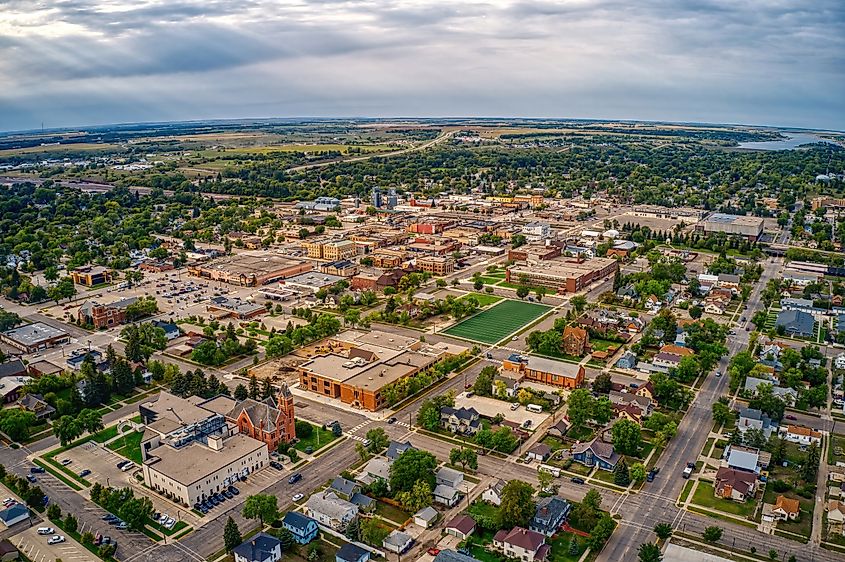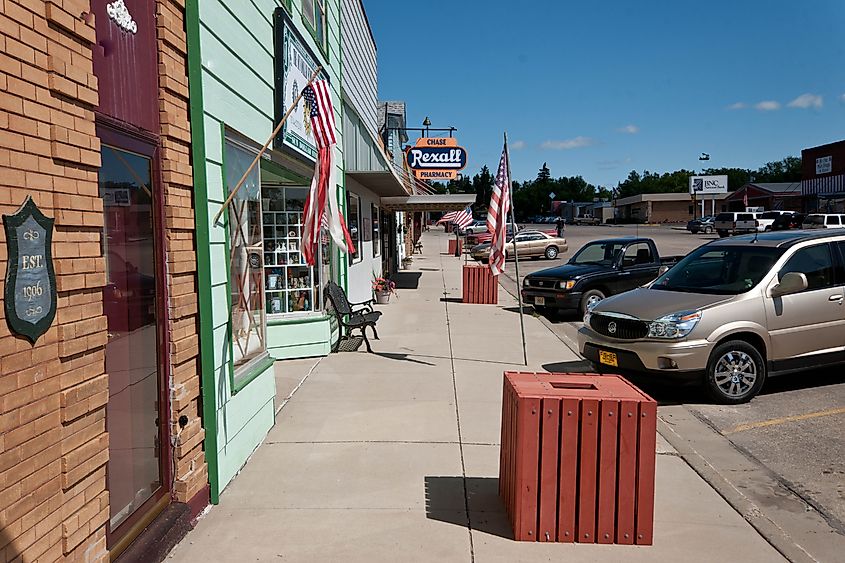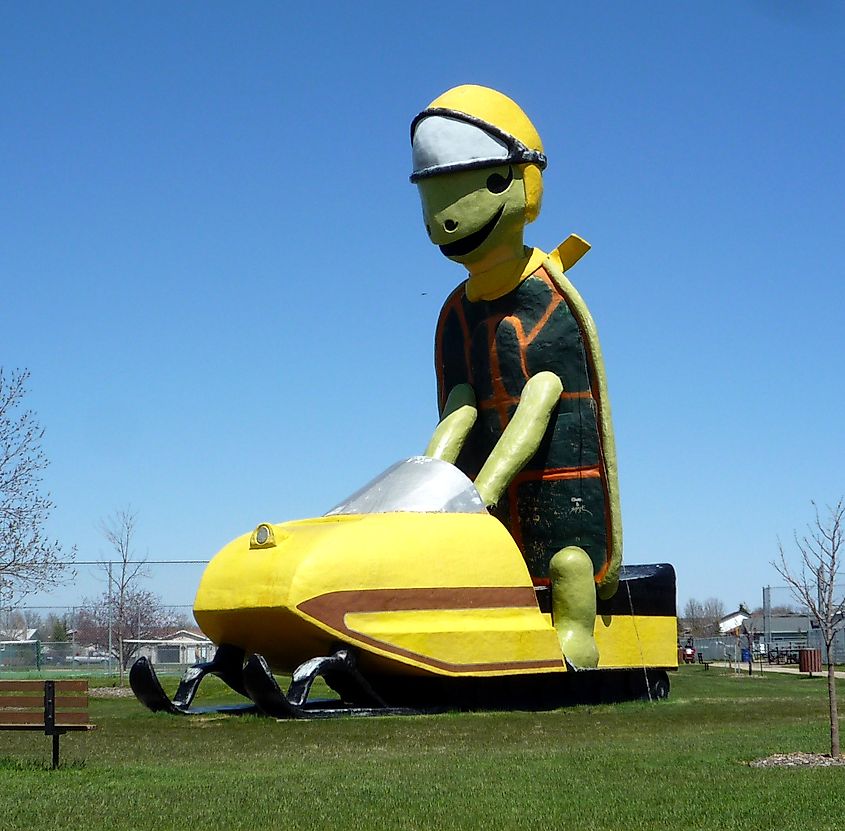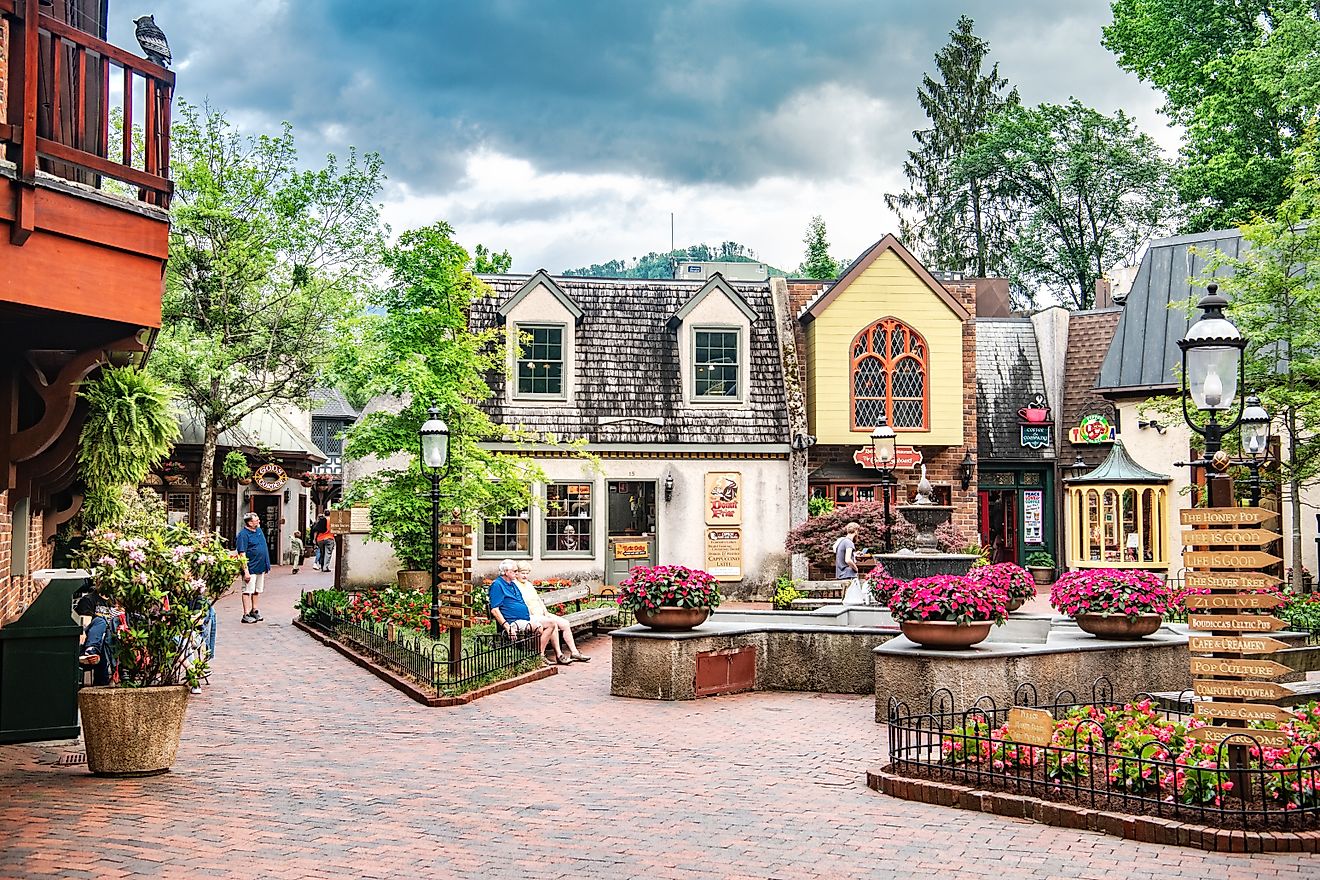
6 Most Inviting Towns in North Dakota
North Dakota has the smallest population and is among the least touristy Midwest states. So, while it may not be as well known as a tourist hotspot as other neighboring states, it is home to the amazing Theodore Roosevelt National Park in Medora, the spectacular Devils Lake, and Lake Sakakawea in Garrison. North Dakota's small towns are full of charm. The towns of Jamestown, Bottineau, and Valley City feature fascinating histories, mystical elements, and scenic views. They are some of the most inviting and picturesque places to explore in the Midwest.
Devils Lake

Lake Region Public Library in Devils Lake, North Dakota. By Richard N Horne, CC BY-SA 4.0, Wikimedia Commons
The small town of Devils Lake, with a population of around 7,500 residents, is situated on the shores of the lake of the same name. Devils Lake is the largest natural lake in North Dakota, covering approximately 122,000 acres and having a maximum depth of around 59 feet. The lake’s name comes from the Native American word “Miniwaukan,” which means “Spirit Water.” Incorrectly translated as “bad spirit,” which led to all sorts of fantastical myths about drownings and lake monsters. Eventually, it evolved into Devils Lake.
Devils Lake is a hub for visitors who enjoy outdoor activities, especially watersports like boating, kayaking, and swimming. The lake is also a very popular spot for fishing, earning the reputation of being the “Perch Capital of the World.” In addition to perch, the lake is home to large numbers of Walleye, Northern Pike, and White Bass. The Woodland Resort offers half-day, full-day, or weekly pontoon or fishing boat rentals, or make life easier by booking one of the resort's guided fishing and lodging packages. The Spirit Lake Casino & Resort is for entertainment junkies who love a good game of craps or classic live entertainment from bands like Bachman-Turner Overdrive or ZZ Top & Lynyrd Skynyrd.
Another site worth visiting is the White Horse Hill National Game Preserve, one of the over 560 National Wildlife Refuges in the U.S. The refuge offers a 4-mile auto tour or more than 3 miles of hiking trails through woodland, prairie, and wetlands. Created as a national park in 1904 by then-President Theodore Roosevelt, White Horse Hill is recognized as contributing to saving bison and elk from extinction. Bison and elk can now be seen at White Horse Hill, as well as white-tailed deer, prairie dogs, and eagles—great for photography buffs.
Medora

The primary attraction in the tiny town of Medora (population under 200) is one of the most impressive national parks in the United States. Medora is one of the Midwest's most impressive national parks—Theodore Roosevelt National Park, named after the former president, who was perhaps the most significant conservation-minded president in American history. The park is divided into “units.” Medora is the gateway town to the South Unit, the park’s most visited place. There are numerous ways to explore the park, like taking a 48-mile stunning scenic drive through the Badlands, hiking two popular self-guided trails—Ridgeline and Coal Vein, or pitching a tent in Cottonwood Campground.
Medora is an excellent setting-off point for day trips on the Maah Daah Hey Trail—known as North Dakota's best-kept secret. The multi-use trail attracts hikers, bikers, and horseback riders. It covers over 140 miles of iconic North Dakota landscapes, including the Badlands, the Little Missouri River Valley, and parts of Theodore Roosevelt National Park. The entire trail can be explored over ten days using the ten campgrounds along the route, but trailheads also allow for day trips.
For history enthusiasts, Chateau de Mores is one of Medora’s best historical sites. This 26-room, 1883-era home was once the summer residence of the Marquis de Mores, who founded the town and named it in honor of his wife. No visit to Medora would be complete without a visit to the North Dakota Cowboy, where visitors can immerse themselves in all things cowboy, from artifacts and memorabilia to interactive exhibits and the history of ranching and rodeo.
Jamestown

Aerial view of Jamestown, North Dakota, along Interstate 94.
Jamestown is one of North Dakota’s larger communities, with 16,000 residents. Located halfway between Bismarck and Fargo, the town’s nickname is ''The Pride of the Prairie.'' One of the most popular roadside attractions in town is Dakota Thunder, the world's largest buffalo monument—a 26-foot, 60-ton concrete monument that has marked the entrance to the Frontier Village since 1959. The Frontier Village is part of the National Buffalo Museum and includes old pioneer buildings, like a barbershop, a trading post, a church, a saloon, and rides on an old stagecoach.
The North American Bison Discovery Center (formerly the National Buffalo Museum) is a 6000-square-foot facility dedicated to restoring the species through education. There are two bison herds at the center, located on either side of Interstate 94 and visible from the interstate. The center’s galleries have various interactive exhibits like touch tables, hands-on areas, and educational games. It also offers guided tours of its bison pastures, where visitors can get up close and personal with the bison and learn about bison behavior, as well as conservation efforts to reintroduce them into the landscape.
Another fun way to explore Jamestown is to follow the Jamestown Talking Trail, a 90-minute interactive self-guided audio tour consisting of over 70 Talking Points, where visitors will hear fascinating stories and first-hand interviews at historic sites and attractions across town, like the Stutsman County Museum, St. James Basilica, the North Dakota Sports Hall of Fame, and more.
Garrison

Garrison is a charming town on the western shores of Lake Sakakawea, one of the largest reservoirs in the state. It is also the “Walleye Capitol of the World,” home of a 26-foot monument affectionately known as “Wally the Walleye.” Garrison is to fish as Jamestown is to buffalo, two towns that acknowledge their connection with the natural world with a bit of humor and a lot of history. Without a doubt, Garrison is a fishing town, and while walleye is the most popular catch, anglers from all over the world have also pulled northern pike, chinook salmon, smallmouth bass, and crapper from the lake. With 1,500 miles of shoreline, more than California, Lake Sakakawea is a popular spot to enjoy the water with activities like sailing, kayaking, and year-round fishing. Numerous lake access points with boat ramps are scattered along the shore, including public access docks and boat rentals in nearby Fort Stevenson and Lake Sakakawea State Parks.
For hiking and camping enthusiasts, Fort Stevenson State Park is a 549-acre park with a campground, a few cabins, a swimming beach, and ten miles of trails for hiking and biking. Rentals are available onsite; visitors can rent anything from a pontoon to a paddleboard. More modern accommodations are available at Indian Hills Resort Resort, where visitors can stay in a condo, a lodge, or the Captain’s Cabin, which comfortably sleeps 11 people. For serious hikers, Lake Sakakawea State Park is the western end of the 4,800-mile North Country National Scenic Trail, which starts in the park and ends in the Green Mountain National Forest in Vermont.
Bottineau

Bottineau is in the Turtle Mountains in the northernmost part of the state. Like much of North Dakota, there is no end to outdoor recreational activities, scenic beauty, and quirky attractions. The town's most notable feature is the iconic 26-foot-tall Tommy the Turtle statue in downtown Bottineau. This statue pays tribute to the region’s turtle heritage and is a selfie destination and landmark for visitors and locals.
Nicknamed the "Four Seasons Playground," Bottineau offers many activities. Tucked in the scenic Turtle Mountains along the U.S. and Canada border, Lake Metigoshe State Park is a top year-round destination. Several small lakes within the park offer kayaking, birding, and canoeing opportunities, while 13 miles of trails offer hiking and mountain biking options. Lodging in the park includes modern and primitive camping sites, cabins, lodges, and yurts. Another Turtle Mountain landmark is Mystical Horizons, an outdoor art installation with a series of granite slabs engraved with various symbols. The arrangement aligns with the summer and winter solstices and other celestial events, creating a unique astronomical calendar. It has become a popular destination for tourists, artists, astronomers, and anyone interested in exploring the intersection of art, science, and spirituality in a stunning natural setting.
Valley City

Coined the “City of Bridges,” Valley City is a perfect destination for “pontophiles,” or people who love bridges. It was also ideal for building bridges to cross the winding Sheyenne River. The town boasts eight historical bridges, the most popular of which is the Highline Bridge. Measuring 3,860 feet long and 162 feet above the river, the Highline Bridge was constructed between 1906 and 1908 and is one of the best engineering wonders to explore in North Dakota. To see all of the historic bridges, take the Valley City Historic Bridges Tour and read the eight interpretive signs while you take in the unique architectural feats of the bridges.
Another way to visit the area is to drive the 63-mile Sheyenne River Vally National Scenic Byway, which passes by 40 historic sites, including Little Yellowstone Park, two log cabins, and six dams. Be sure to pull over to shop or dine and experience Midwest Americana charm at its best.
Medicine Wheel Park is a scenic landmark on the Valley City State University campus. What began as a class project in 1992 has evolved into one of the state’s major tourist attractions, encompassing 30 acres. The Medicine Wheel’s central circle spans 213 feet. Twenty-eight spokes radiate from its center, representing the number of days in the lunar cycle. Six spokes extending well beyond the Wheel align to the horizon of sunrises and sunsets on the first days of the four seasons. Inspired by Wyoming's Big Horn Medicine Wheel, Valley City’s sculpture embodies the awe-inspiring journey of Earth around the Sun and the majestic cycle of the seasons.
Discover North Dakota's Hidden Gems
North Dakota is indeed a state that likes its monuments. From buffalos to fish to turtles, these iconic landmarks draw 22 million yearly tourists to the state. Beyond the quirky attractions, the 19th largest state in the United States offers visitors unforgettable outdoor adventures like epic hiking, horseback riding, kayaking, and wildlife viewing. The state’s conservation efforts are laudable, with its 63 national wildlife refuges encompassing 290,000 acres of land. So why not go “where the buffalo roam, and the skies are not cloudy all day?”











